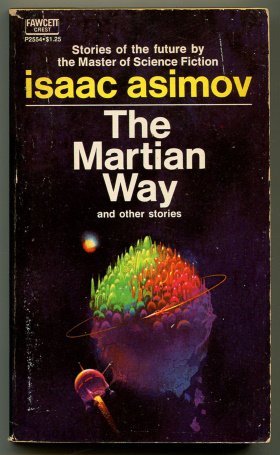Long said, with an effort at nonchalance, ‘Enough.’
‘In that case, get home as fast as you can. Don’t take any chances, of course.’
‘There’s trouble, then.’
‘Fair to middling. When will you come down?’
‘Two days. Can you hold out that long?’
‘I’ll hold out.’
Forty hours later Mars had grown to a ruddy-orange ball that filled the ports and they were in the final planet-landing spiral.
‘Slowly,’ Long said to himself, ‘slowly.’ Under these conditions, even the thin atmosphere of Mars could do dreadful damage if they moved through it too quickly.
Since they came in from well above the ecliptic, their spiral passed from north to south. A polar cap shot whitely below them, then the much smaller one of the summer hemisphere, the large one again, the small one, at longer and longer intervals. The planet approached closer, the landscape began to show features.
‘Prepare for landing!’ called Long.
11
Sankov did his best to look placid, which was difficult considering how closely the boys had shaved their return. But it had worked out well enough.
Until a few days ago, he had no sure knowledge that they had survived. It seemed more likely – inevitable, almost – that they were nothing but frozen corpses somewhere in the trackless stretches from Mars to Saturn, new planetoids that had once been alive.
The Committee had been dickering with him for weeks before the news had come. They had insisted on his signature to the paper for the sake of appearances. It would look like an agreement, voluntarily and mutually arrived at. But Sankov knew well that, given complete obstinacy on his part, they would act unilaterally and be damned with appearances. It seemed fairly certain that Hilder’s election was secure now and they would take the chance of arousing a reaction of sympathy for Mars.
So he dragged out the negotiations, dangling before them always the possibility of surrender.
And then he heard from Long and concluded the deal quickly.
The papers had lain before him and he had made a last statement for the benefit of the reporters who were present.
He said, ‘Total imports of water from Earth are twenty million tons a year. This is declining as we develop our own piping system. If I sign this paper agreeing to an embargo, our industry will be paralyzed, any possibilities of expansion will halt. It looks to me as if that can’t be what’s in Earth’s mind, can it?’
Their eyes met his and held only a hard glitter. Assemblyman Digby had already been replaced and they were unanimous against him.
The Committee Chairman impatiently pointed out, ‘You have said all this before.’
‘I know, but right now I’m kind of getting ready to sign and I want it clear in my head. Is Earth set and determined to bring us to an end here?’
‘Of course not. Earth is interested in conserving its irreplaceable water supply, nothing else.’
‘You have one and a half quintillion tons of water on Earth.’
The Committee Chairman said, ‘We cannot spare water.’ And Sankov had signed.
That had been the final note he wanted. Earth had one and a half quintillion tons of water and could spare none of it.
Now, a day and a half later, the Committee and the reporters waited in the spaceport dome. Through thick, curving windows, they could see the bare and empty grounds of Mars Spaceport.
The Committee Chairman asked with annoyance, ‘How much longer do we have to wait? And, if you don’t mind, what are we waiting for?’
Sankov said, ‘Some of our boys have been out in space, out past the asteroids.’
The Committee Chairman removed a pair of spectacles and cleaned them with a snowy-white handkerchief. ‘And they’re returning?’
‘They are.’
The Chairman shrugged, lifted his eyebrows in the direction of the reporters.
In the smaller room adjoining, a knot of women and children clustered about another window. Sankov stepped back a bit to cast a glance toward them. He would much rather have been with them, been part of their excitement and tension. He, like them, had waited over a year now. He, like them, had thought, over and over again, that the men must be dead.
‘You see that?’ said Sankov, pointing.
‘Hey!’ cried a reporter. ‘It’s a ship!’
A confused shouting came from the adjoining room.
It wasn’t a ship so much as a bright dot obscured by a drifting white cloud. The cloud grew larger and began to have form. It was a double streak against the sky, the lower ends billowing out and upward again. As it dropped still closer, the bright dot at the upper end took on a crudely cylindrical form.
It was rough and craggy, but where the sunlight hit, brilliant highlights bounced back.
The cylinder dropped toward the ground with the ponderous slowness characteristic of space vessels. It hung suspended on those blasting jets and settled down upon the recoil of tons of matter hurling downward like a tired man dropping into his easy chair.
And as it did so, a silence fell upon all within the dome. The women and children in one room, the politicians and reporters in the other remained frozen, heads craned incredulously upward.
The cylinder’s landing flanges, extending far below the two rear jets, touched ground and sank into the pebbly morass. And then the ship was motionless and the jet action ceased.

























